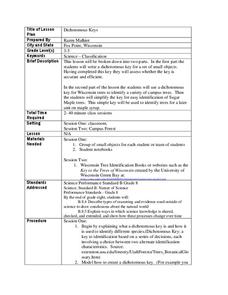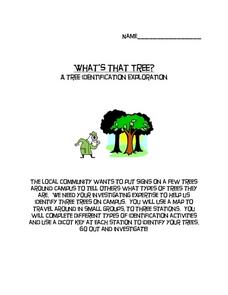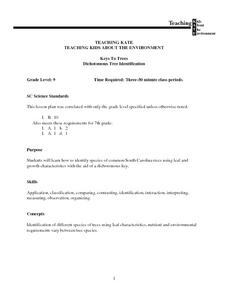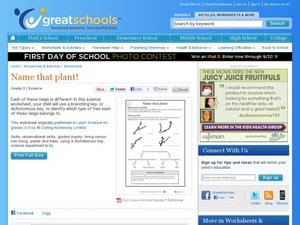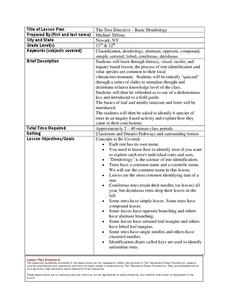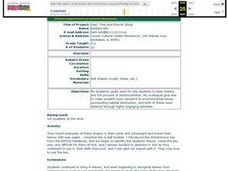Curated OER
Dichotomous Keys
Students define the word dichotomous and explain why a dichotomous key is a useful tool in identifying different species. Then they look up words they are unfamiliar with or mollusk reference books so students can
learn the names of...
Curated OER
Dichotomous Key
Students draw comparisons between organisms. They classify organisms. Students are introduced to dichotomous keys and how to create and use a dichotomous key to identify a variety of objects. They begin by defining classification, and...
Curated OER
Discovering Dichotomous Keys
Students become familiar with the structure and use of dichotomus keys. They demonstrate a comprehension of the fundamental principles of taxonomy by classifying organisms from a local ecosystem. Students are introduced to the term...
Curated OER
Dichotomous Keys
Students utilize dichotomous keys to identify trees in their schools. In this ecological identification lesson, students practice creating dichotomous keys based on simple subjects such as hair color or sex of a person....
Curated OER
What's That Tree?
Fifth graders identify trees along a nature trail. Using a dichotomous key, 5th graders answer questions to aid in their identification of trees along a specified nature trail. Observations are recorded in their science journals. Sample...
Curated OER
Keys To Trees: Dichotomous Tree Identification
Ninth graders gather samples of different tree leaves in their neighborhoods, and on school grounds, and identify several species of common South Carolina trees using leaf and growth characteristics with aid of dichotomous key.
Curated OER
Classification, Keys, and Phylogenetci Trees
Learners analyze relationships about animals and create a model of classifications based on both the similarities and the differences. They also discuss a dichotomous key before they create a cladograph using different types of candy.
Curated OER
Dichotomous Key for Identifying Pine Trees
Middle schoolers identify the species of pine trees that are found in their area. They use unlabeled "mystery" samples and a dichotomous key to identify the pine trees to species. After identification, they use a field guide to answer...
Curated OER
Building a Dichotomous Key
Students analyze how a dichotomous key helps us explain and identify unknown organisms. They design and construct a dichotomous key, developing a list of three observable characteristics per organism.
Curated OER
Creating a Dichotomous Key for Families of Idaho Butterflies
Young scholars are shown how to use the butterfly section of the Digital Altals of Idaho. They discuss how to make a dichotomous key. Students use their skills of observation and recognize defining characteristics that distinguish...
Curated OER
Desinging and Using a Dichotomous Key
High schoolers are examine the purpose of dichotomous keys. In groups, they design their own in order to describe the characteristics of plants and weeds native to California. To end the lesson, they define new terminology associated...
Curated OER
Name that plant!
What is a dichotomous key? When your kids ask, hand them a learning exercise like this one, to explain it. They use the key to identify four different trees, based on the budding twigs they've produced. Tip: Have learners extend this...
Curated OER
Distinguishing Between Flowers
A branching key is a great way to classify different types of animals and plants! Fifth graders answer several yes/no answers about three different plants. They then create their own key to differentiate between an iris, a rose, and a...
Purdue University
Trees of the Midwest
All trees are not created equal. A set of three wildlife conservation lessons has learners examine the characteristics of individual trees. They look at the life cycle of the tree using a story and reference a field guide to identify...
Curated OER
Seeds and Trees Lesson Plan
Students investigate various tree leaves and use a dichotomous key to classify the leaves. In this leaf classification lesson, students study various types of leaves and their Genus. Students record observations for each Genus.
Curated OER
A Tree-mendous Project
Seventh graders use their observation and measurement skills to identify trees. Using a tree diagram, they label the parts and discuss the functions of the tree. They practice using a dichotomous key to identify trees as well.
Curated OER
Life Cycle of Trees
Turn your students into young tree-tectives with this fun science investigation into the life of trees. To begin, a class volunteer gets dressed up in a tree costume as the different parts of trees are introduced. Then, the class...
Curated OER
Dichotomous Key
In this species worksheet, students use a dichotomous key to identify the 8 different species of "Norns," a fictitious animal group.
Curated OER
Tree Identification/Tree Art
Seventh graders identify and examine a deciduous and coniferous tree. Using the descriptions, they discover the types of tress in their local area. As a class, they practice identifying trees on a walk in a park collecting leaves. They...
Chicago Botanic Garden
Impacts of Climate on Forest Succession
Part two in a series of four explores the effects of climate on succession or the changing of plant species in a forest. Groups review how to identify trees and then spend a day in the field collecting extensive data on trees to...
Curated OER
Seeds in Fall...Collect Them All!
Classify seeds by attributes such as size, shape and color! Learners classify seeds using a dichotomous key. They identify human behaviors that have a positive impact on preserving seed and plant biodiversity.
Curated OER
The Tree Detective - Basic Dendrology
Students identify tree species by their leaf characteristics. In this dendrology lesson plan, students learn leaf vocabulary and collect leaves. They identify the leaves using the leaf characteristics and the vocabulary that they learned.
Curated OER
Leaf, Tree and Prairie Study
Learners are introduced to the topic of Botany and the process of photosynthesis. Using various habitats, they research the amount of destruction it is facing and how to solve the problem. They make a leaf booklet with leaves they find...
Curated OER
How Appropriate is that Tree?
Students identify trees and their environments using a dichotomous chart. In this exploratory activity students use the Internet to identify conditions needed for the trees and what the climate is in their area.





